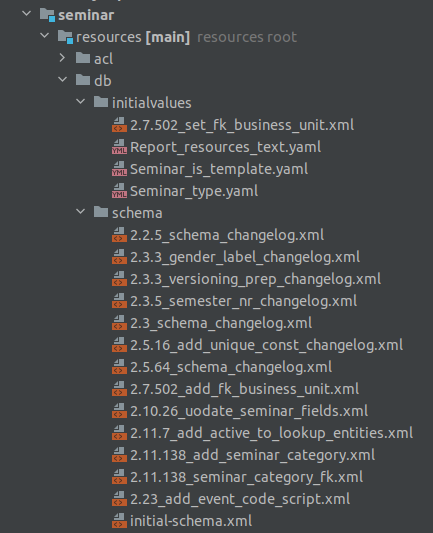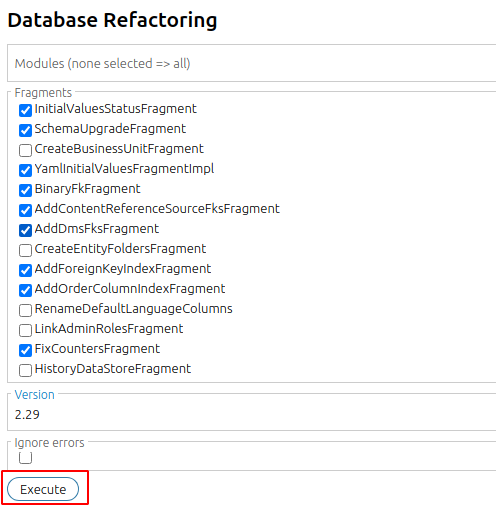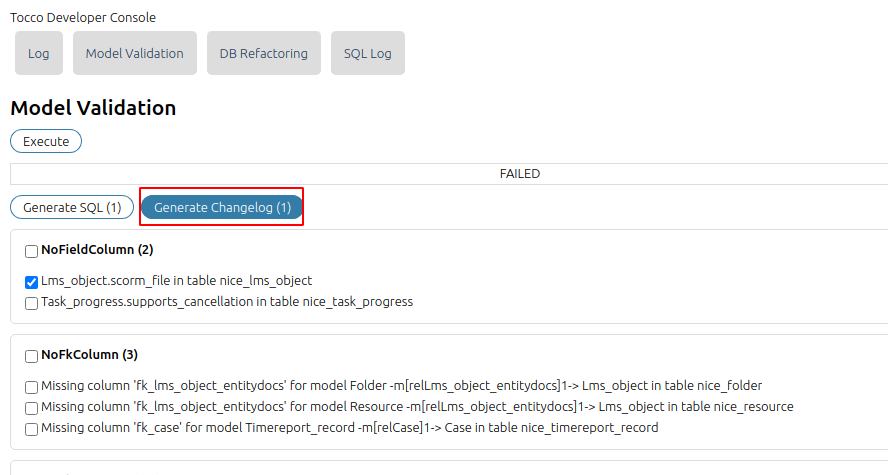This is an internal documentation. There is a good chance you’re looking for something else. See Disclaimer.
Changesets
We use Liquibase to create our database, adjust the database schema, insert initial values and adjust existing records. Liquibase runs so called changelog files. These are versioned XML files and they contain all instructions necessary for a database to be created or updated.
Warning
While initial values used to be handled through Liquibase, we have since decided to switch to storing the initial values in separate files. These provide a more consistent way of defining initial values at any given point in time. All functionality in this documentation about initial value changesets still work, but should not be used anymore. See Initial Values for further information.
The Liquibase documentation provides details on all its capabilities, although most parts of the changelogs can be created automatically (see Automatic creation).
Format
The smallest possible changelog file, without any actual changesets in it, contains the following lines.
<?xml version="1.0" encoding="UTF-8"?>
<databaseChangeLog xmlns="http://www.liquibase.org/xml/ns/dbchangelog"
xmlns:xsi="http://www.w3.org/2001/XMLSchema-instance"
xsi:schemaLocation="http://www.liquibase.org/xml/ns/dbchangelog http://www.liquibase.org/xml/ns/dbchangelog/dbchangelog-2.0.xsd">
<!-- changesets go here -->
</databaseChangeLog>
Any number of changesets can then be added to this changelog, but they should generally pertain to roughly the same topic. A changeset always needs to contain its author, an id (see Changeset-ID), a context (see Context), a precondition (see Preconditions) and some actual instructions to run.
<changeSet author="ln" dbms="postgresql" id="example_changeset/1.2.3.4">
<preConditions onFail="MARK_RAN">
<sqlCheck expectedResult="0">
SELECT count(*)
FROM some_table
</sqlCheck>
</preConditions>
<insert tableName="some_table">
<column name="a_column" value="value"/>
</insert>
</changeSet>
See Examples for complete real life examples.
File locations
Changelog files are stored under resources/db in one of the folders initialvalues or schema.

As the name suggests, schema contains all changelogs that change the database schema (creating tables, altering
constraints, removing columns, etc.), while initialvalues contains all changelogs that work with the data itself.
Filename
The name of a changelog file consists of the version (as specified in the application property nice.version)
the changelog will be run in, a name that describes the work the changesets do and the ending .xml, all
separated by underscores. Examples of a good filename would be 2.12.2_add_peer_mail_fks.xml or
2.4.50_change_education_amount_to_duration.xml.
Changeset-ID
Each changeset in a changelog must have an id that is unique in its module, although it is preferred if the id is unique in the entire repository.
The id must end with the version the changeset should be run in. In contrast to the version
from the filename, the id can have more detailed sub-versions so ensure the order the changesets are run in, e.g.
2.4.5.2 instead of just 2.4.5. The first three sub-versions will generally match the version from the filename,
although any version can be used when needed for special cases.
The part of the id in front of the version can be any alpha-numerical text. It needs to be separated from the version
by a slash and should not be overly long. Examples of good ids would be changeFieldTypeFromTimeToLong/2.4.50 or
add_fk_column_fk_email_template_invitation_peer-l9URpWVvvJO/2.12.2.0.
Context
While a context is not actually necessary to run changesets, we use them to order our changesets in a given version.
It is therefore always necessary to think about the context of a changeset. We use 2 different contexts,
schemaDefinition and schemaConstraints, with the absence of a context signifying a changeset that works with
data instead of the schema. When running the changesets for a version, all changesets with the context
schemaDefinition are run first, then those without a context, then those with schemaConstraints. As an example,
this allows the creation of non-nullable columns in existing tables, by creating the column in schemaDefinition,
filling it with some data, and then only setting the NOT NULL constraint in schemaConstraints.
Preconditions
Each changeset needs to contain a precondition that only allows the changeset to run when it is actually able to finish
correctly, for instance checking that a column does not exist before adding it or asserting that a unique value is only
inserted if it does not exist yet. These preconditions should always be marked as onFail="MARK_RAN" so they do not
interrupt our deployments.
File resources in changesets
There are moments when we need to write files to the database as initial values (mostly used to upload images used in
report generation). This can be done by creating a changeset in version 9.9.9.9 (since the rest of the database must
must be up to date for the DMS services to work) and using the custom change
AddEntityDocChange. This custom change
then uploads the file to the DMS and sets the hash on the given entity.
Working with Liquibase
Running changesets
Changeset usually only run once against a single database. A hash is generated from the changeset, and if it ever
changes Liquibase will throw an error. This can be circumvented by marking a changeset with runOnChange="true",
which is necessary for changesets that might actually change (like localized columns which get added once for each
installed language), but should otherwise be avoided.
Changesets can be run in one of two ways.
- Changelogs of modules from a version on (DevCon)
Select the modules you want to run the changesets for. Select which fragments (see InstallFragment) should be executed, define a version and press the Execute button. All changesets in the modules you selected, starting at the version you defined (no version means running all versions) will be executed. Do not deactivate
SchemaUpgradeFragment, that’s the fragment that actually runs changesets.- All changesets
Setup Nice2 to run in update mode (
-Dch.tocco.nice2.runenv=update). The system will then start and run all changelogs from all modules.

Automatic creation
Writing changesets by hand can be tedious work. The better way to create changesets is to adjust the model however you want (see Entities and Relations) and then let the changesets be generated.
The DevCon will show you any differences between the data model and the actual tables and columns in the database.
From there you can select all changes you’d like to generate changesets for and press the Generate Changelog
button (highlighted in red).

This does not work for a few changes, such as:
renaming a column (generated changesets will just drop the old column and create a new one)
changing a relation from multi to single or the other way around (data will not be migrated automatically)
migrating data when changing the data type to something that postgres can’t handle by itself
Whatever you do, always check the generated changesets for their correctness and check the result after running them.
Additionally, you can create changesets for initial values by evaluation a TQL query by pressing the
button Initial Values for Query (highlighted in blue) in the tab seen in the Running changesets image.
History of ran changesets
It is possible to see what changesets have already ran against a database by checking the databasechangelog table.
By looking for a record where the id column starts with the id of a changeset we can see if it was ever ran against
the database. The column exectype either contains EXECUTED, for changesets that were actually ran, or
MARK_RAN, for changesets that failed their precondition.
Tocco-specific extensions
ChangesetNodeProcessor
These processors run against the changesets when they’re being run. They can add new tags, remove unnecessary ones and do whatever’s deemed necessary.
- ApplyRunOnChangeProcessor
marks all changesets, that have any columns with the remark
localized, withrunOnChange="true"
- DuplicateLanguagesProcessor
duplicates any columns with the remark
localizedfor each installed language
- ExtendLocalizedValuesProcessor
checks if an insert or update statement on localized columns are missing values for installed languages and copies the value of an existing language so it has some value to use.
- KeepDefaultLangProcessor
removes any drop column instructions that would drop the default language if it has the remark
nodefault
- LocalizedColumnNameProcessor
updates any localized column names so they contain their language identifier
- PreconditionProcessor
tries to generate a precondition if none exists yet by looking for identifier columns
- RemoveLanguagesProcessor
removes any column definition for languages that are not installed
- RemoveRemarksProcessor
removes any remarks from all changesets after they’ve been handled
- VersionContextProcessor
adds version to context
CustomTaskChange
Custom changes can be used in changesets to call some java logic with parameters. Check their JavaDoc for exact information on what arguments each uses.
- AddEntityDocChange
used to upload binaries and attach them to an entity
- CopyToBusinessUnitChange
copies entities between business units
- LocalizeFieldChange
used to localize a column after it has been created
- MigrateLocalizedEntityChange
copy localized entities between tables
- RunFragmentChange
run a InstallFragment
- SingleToMultiRelationChange
migrates data from a single relation to a multi relation, it does not create the n:n table
- UpdateLocalizedFieldChange
updates a localized column
AbstractPrecondition
These are customized preconditions written in java.
- ImprovedForeignKeyExistsPrecondition
a replacement for the foreignKeyConstraintExists precondition that is optimized for postgres
InstallFragment
Fragments are some java logic that runs database commands. These are usually things that need to run before or after all the changesets, for instance creating business units or fixing counters.
- AddContentReferenceSourceFksFragment
add foreign key columns to Content_reference_source to entity models that have at least one html field
- AddDmsFksFragment
add foreign key columns needed for entity doc relations
- AddForeignKeyIndexFragment
creates indexes for all foreign keys
- AddOrderColumnIndexFragment
creates index for each model on its update timestamp field
- BinaryFkFragment
creates a foreign key to the binary table for each field of type binary
- CreateBusinessUnitFragment
creates business units as defined in application.properties
- CreateEntityFoldersFragment
creates empty folders to store entity docs in for each entity
- FixCountersFragment
resets all counter entities
- LinkAdminRolesFragment
links all manager roles to the tocco principal
- RenameDefaultLanguageColumns
renames all localized columns that do not yet have a language identifier so they belong to the default language (e.g.
labeltolabel_de)
- SchemaUpgradeFragment
run changesets
- UpgradeLanguageFragment
attempts to install a new language by running changesets
Others
- BusinessUnitChangelogPostProcessor
copies a changeset marked with
runForEachBu="true"for each business unit and replaces any occurrence of%BUSINESS_UNIT%with the unique id of the business unit it is copying to
Examples
Create a table
<!-- add table -->
<changeSet author="lz" context="schemaDefinition" dbms="postgresql" id="init_schema_definition/2.5.61">
<preConditions onFail="MARK_RAN">
<not>
<tableExists tableName="nice_event_source"/>
</not>
</preConditions>
<createTable tableName="nice_event_source">
<column name="_nice_version" type="bigint"/>
<column name="_nice_create_timestamp" type="timestamp with time zone"/>
<column name="_nice_update_timestamp" type="timestamp with time zone"/>
<column name="_nice_create_user" type="VARCHAR(255)"/>
<column name="_nice_update_user" type="VARCHAR(255)"/>
<column name="unique_id" remarks="identifier" type="VARCHAR(255)"/>
<column name="sorting" type="int"/>
<column name="label" remarks="localized" type="VARCHAR(255)"/>
<column name="pk" type="bigserial">
<constraints primaryKey="true"/>
</column>
</createTable>
</changeSet>
<!-- add constraints -->
<changeSet author="lz" context="schemaConstraints" dbms="postgresql" id="init_constr/2.5.61" runOnChange="true">
<preConditions onFail="MARK_RAN">
<not>
<foreignKeyConstraintExists foreignKeyName="nice_event_fk_event_source_fkey" foreignKeyTableName="nice_event"/>
</not>
</preConditions>
<addForeignKeyConstraint baseColumnNames="fk_event_source" baseTableName="nice_event" constraintName="nice_event_fk_event_source_fkey" onDelete="RESTRICT" referencedColumnNames="pk" referencedTableName="nice_event_source"/>
<addNotNullConstraint columnName="_nice_version" remarks="" tableName="nice_event_source"/>
<addNotNullConstraint columnName="_nice_create_timestamp" remarks="" tableName="nice_event_source"/>
<addNotNullConstraint columnName="_nice_update_timestamp" remarks="" tableName="nice_event_source"/>
<addNotNullConstraint columnName="_nice_create_user" remarks="" tableName="nice_event_source"/>
<addNotNullConstraint columnName="_nice_update_user" remarks="" tableName="nice_event_source"/>
<addNotNullConstraint columnName="unique_id" remarks="identifier" tableName="nice_event_source"/>
<addUniqueConstraint columnNames="unique_id" constraintName="nice_event_source_unique_id_key" tableName="nice_event_source"/>
<addNotNullConstraint columnName="pk" remarks="" tableName="nice_event_source"/>
</changeSet>
<!-- add not null constraint for localized fields -->
<changeSet author="lz" context="schemaConstraints" dbms="postgresql" id="labels/2.5.61">
<addNotNullConstraint columnName="label" remarks="localized" tableName="nice_event_source"/>
</changeSet>
Add a localized column (with default value)
<changeSet author="ng" context="schemaDefinition" dbms="postgresql" id="add_column_entity_label_de-j69IK4c/2.11.161.0" runOnChange="true">
<preConditions onFail="MARK_RAN">
<not>
<columnExists columnName="entity_label" remarks="localized" tableName="nice_output_job"/>
</not>
</preConditions>
<addColumn tableName="nice_output_job">
<column defaultValue="" name="entity_label" remarks="localized" type="VARCHAR(255)"/>
</addColumn>
<dropDefaultValue columnName="entity_label" remarks="localized" tableName="nice_output_job"/>
</changeSet>
Localize a column
<changeSet author="dg" context="schemaDefinition" dbms="postgresql" id="localize_fields/2.3.12" runOnChange="true">
<preConditions onFail="MARK_RAN">
<columnExists tableName="nice_correspondence_template" columnName="attachment"/>
</preConditions>
<customChange class="ch.tocco.nice2.dbrefactoring.impl.liquibase.LocalizeFieldChange">
<param name="tableName" value="nice_correspondence_template"/>
<param name="columnName" value="attachment"/>
<param name="columnType" value="text"/>
</customChange>
</changeSet>
Remove a column
<changeSet author="sisa" context="schemaDefinition" dbms="postgresql" id="drop_column_fk_article-QRqkGV1HZ/2.11.47.0">
<preConditions onFail="MARK_RAN">
<columnExists columnName="fk_article" tableName="nice_article_document"/>
</preConditions>
<dropColumn columnName="fk_article" tableName="nice_article_document"/>
</changeSet>
Add a lookup entity
<changeSet author="rofr" dbms="postgresql" id="values-CdReLeMhDfR/2.16">
<preConditions onFail="MARK_RAN">
<sqlCheck expectedResult="0">select count(*) from nice_report_resources_text where unique_id = 'membership_statistic_deadline'</sqlCheck>
</preConditions>
<insert tableName="nice_report_resources_text">
<column name="unique_id" remarks="identifier" value="membership_statistic_deadline"/>
<column name="label" value=""/>
<column name="text" remarks="lang:de" value="Stichtag"/>
<column name="_nice_version" valueNumeric="0"/>
<column name="_nice_create_timestamp" valueComputed="NOW()"/>
<column name="_nice_update_timestamp" valueComputed="NOW()"/>
<column name="_nice_create_user" value="tocco"/>
<column name="_nice_update_user" value="tocco"/>
<column name="fk_report_resources" valueComputed="(select pk from nice_report_resources where unique_id = 'membership')"/>
</insert>
</changeSet>
Update a lookup entity
<changeSet author="jere" dbms="postgresql" id="values-TULjr1lE/2.9.67.0">
<preConditions onFail="MARK_RAN">
<sqlCheck expectedResult="1">select count(*) from nice_event_status where unique_id = 'open'</sqlCheck>
</preConditions>
<update tableName="nice_event_status">
<column name="label" remarks="lang:de" value="Definitiv"/>
<where>unique_id = 'open'</where>
</update>
</changeSet>
Add a binary to entity
<!-- create entity -->
<changeSet author="ln" dbms="postgresql" id="values-5hrydw4wWb/2.10.80.0">
<preConditions onFail="MARK_RAN">
<sqlCheck expectedResult="0">select count(*) from nice_report_resources_image where unique_id = 'modules_grades_header'</sqlCheck>
</preConditions>
<insert tableName="nice_report_resources_image">
<column name="unique_id" remarks="identifier" value="modules_grades_header"/>
<column name="label" value=""/>
<column name="_nice_version" valueNumeric="1"/>
<column name="_nice_create_timestamp" valueComputed="NOW()"/>
<column name="_nice_update_timestamp" valueComputed="NOW()"/>
<column name="_nice_create_user" value="tocco"/>
<column name="_nice_update_user" value="tocco"/>
<column name="fk_report_resources" valueComputed="(select pk from nice_report_resources where unique_id = 'qualification')"/>
</insert>
</changeSet>
<!-- upload file to binary -->
<changeSet author="ln" dbms="postgresql" id="addEntityDocs1and-ASlkjd2cawsdwadjwkjlkasd/9.9.9.9" runOnChange="true">
<preConditions onFail="MARK_RAN">
<sqlCheck expectedResult="1">SELECT count(*) FROM nice_report_resources_image WHERE unique_id = 'modules_grades_header'</sqlCheck>
</preConditions>
<customChange class="ch.tocco.nice2.dbrefactoring.impl.liquibase.AddEntityDocChange">
<param name="publishStatus" value="published"/>
<param name="fileName" value="nice2.customer.bbg:/db/resources/modules_grades_header.png"/>
<param name="entityModel" value="Report_resources_image"/>
<param name="uniqueId" value="modules_grades_header"/>
<param name="binaryFieldName" value="single_image"/>
<param name="resourceName" value="single_image"/>
</customChange>
</changeSet>
Migrate single relation to multi
<!-- create n:n table -->
<changeSet author="anbo" context="schemaDefinition" dbms="postgresql" id="add_table_nice_registration_to_absence_reason-QYrs3z/2.12.28.0">
<preConditions onFail="MARK_RAN">
<not>
<tableExists tableName="nice_registration_to_absence_reason"/>
</not>
</preConditions>
<createTable tableName="nice_registration_to_absence_reason">
<column name="fk_registration" remarks="" type="bigint"/>
<column name="fk_absence_reason" remarks="" type="bigint"/>
</createTable>
</changeSet>
<!-- constraints on n:n table -->
<changeSet author="anbo" context="schemaConstraints" dbms="postgresql" id="add_table_nice_registration_to_absence_reason_constr-OxNY2MD8m/2.12.28.0">
<preConditions onFail="MARK_RAN">
<not>
<foreignKeyConstraintExists foreignKeyName="nice_registration_to_absence_reason_fk_registration_fkey" foreignKeyTableName="nice_registration_to_absence_reason"/>
</not>
</preConditions>
<addForeignKeyConstraint baseColumnNames="fk_registration" baseTableName="nice_registration_to_absence_reason" constraintName="nice_registration_to_absence_reason_fk_registration_fkey" onDelete="RESTRICT" referencedColumnNames="pk" referencedTableName="nice_registration"/>
<addForeignKeyConstraint baseColumnNames="fk_absence_reason" baseTableName="nice_registration_to_absence_reason" constraintName="nice_registration_to_absence_reason_fk_absence_reason_fkey" onDelete="RESTRICT" referencedColumnNames="pk" referencedTableName="nice_absence_reason"/>
<addNotNullConstraint columnName="fk_registration" tableName="nice_registration_to_absence_reason"/>
<addNotNullConstraint columnName="fk_absence_reason" tableName="nice_registration_to_absence_reason"/>
<addPrimaryKey columnNames="fk_registration,fk_absence_reason" tableName="nice_registration_to_absence_reason"/>
</changeSet>
<!-- run custom change for data migration -->
<changeSet author="anbo" context="schemaDefinition" id="registration_to_absence_reason_single_to_multi-DFssdre3z/2.12.28.1">
<preConditions onFail="MARK_RAN">
<columnExists columnName="fk_absence_reason" tableName="nice_registration"/>
</preConditions>
<customChange class="ch.tocco.nice2.dbrefactoring.impl.liquibase.SingleToMultiRelationChange">
<param name="sourceTableName" value="nice_registration"/>
<param name="singleRelationFkName" value="fk_absence_reason"/>
<param name="multiRelationTableName" value="nice_registration_to_absence_reason"/>
<param name="fkNameToSourceTable" value="fk_registration"/>
<param name="fkNameToTargetTable" value="fk_absence_reason"/>
</customChange>
</changeSet>
<!-- drop old single relation column -->
<changeSet author="anbo" context="schemaDefinition" dbms="postgresql" id="drop_column_fk_absence_reason-uDezn9KbOuj/2.12.28.2">
<preConditions onFail="MARK_RAN">
<columnExists columnName="fk_absence_reason" tableName="nice_registration"/>
</preConditions>
<dropColumn columnName="fk_absence_reason" tableName="nice_registration"/>
</changeSet>
Change datatype
<changeSet author="crz" context="schemaDefinition" dbms="postgresql" id="fix_datatype_valid_from/2.5.58.0">
<preConditions onFail="MARK_RAN">
<columnExists columnName="valid_from" tableName="nice_address_user"/>
</preConditions>
<modifyDataType columnName="valid_from" newDataType="date" tableName="nice_address_user"/>
</changeSet>